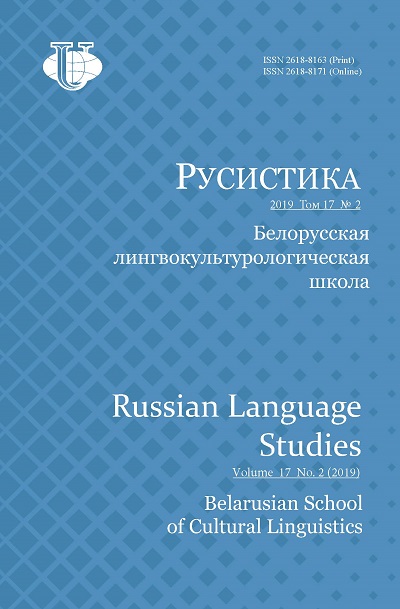Multicultural identity in the context of urban landscape
- Authors: Poplavskaia T.V1
-
Affiliations:
- Minsk State Linguistic University
- Issue: Vol 17, No 2 (2019): Belarusian School of Cultural Linguistics
- Pages: 213-228
- Section: Cultural Linguistics: Theoretical and Applied Aspects
- URL: https://journals.rudn.ru/russian-language-studies/article/view/21116
- DOI: https://doi.org/10.22363/2618-8163-2019-17-2-213-228
- ID: 21116
Cite item
Full Text
Abstract
The purpose of the article is to identify and describe the structure of urban signs containing code switching, foreign language or pseudo-foreign language information. This topic seems to be relevant, since modern cities with a Russian-speaking population are flooded with inscriptions that mislead about foreign cultural realities and are executed with grammatical and lexical errors. In the course of the study, the names of catering establishments, beauty salons, car service enterprises and law firms, fixed on the signboards of the respective organizations and presented for public viewing were analyzed. The specificity of the designations of service enterprises of various kinds and its compliance/nonconformity with the mission of the organization has been established. Analyzing the signboards as a verbal fragment of the urban landscape, the author of the article comes to the conclusion that it is necessary to introduce a new term - pseudo-multicultural identity. The phenomenon of pseudo-multicultural identity characterizes the communicative space of a large city and can be considered a destructive phenomenon formed in a pseudo-other-cultural environment, where the authors of foreign names neglect both the structure and the meaning of the proposed designations, and the target audience forms inadequate language stereotypes.
About the authors
Tat’yana V Poplavskaia
Minsk State Linguistic University
Author for correspondence.
Email: taniapoplavskaia@gmail.com
Doctor of Philology, Professor, Head of the Department of Speech and Communication Theory, Minsk State Linguistic University, member of the Higher Certification Commission of the Republic of Belarus, head of the research group “Language situation in Belarus: intercultural aspect” (Minsk, Republic of Belarus). Research interests: communication space, communication strategies, organizational communication, intercultural communication
21 Zaharova St., Minsk, 220034, Republic of BelarusReferences
- Arutyunova, N.D. (1999). Yazyk i mir cheloveka [Language and the world of man]. Moscow: Yazyki russkoi kul’tury Publ. (In Russ.)
- Belova, K.A. (2014). Internet-diskurs Belarusi v sotsiolingvisticheskom aspekte [Internet discourse of Belarus in sociolinguistic aspect] (Candidate dissertation). Minsk. (In Russ.)
- Benwell, B.M. (2002). Constructing discussion tasks in university tutorials: shifting dynamics and identities. Discourse Studies, 4, 429-453.
- Boas, F. (1997). Metody etnologii [Methods of Ethnology]. Antologiya issledovanii kul’tury [Anthology of Cultural Studies]. Saint Petersburg: Universitetskaya kniga Publ. (In Russ.)
- Derrida, J. (1976). Of grammatology. Baltimore: Johns Hopkins University Publ.
- Dronenko, D.M. (2003). Natsional’no-kul’turnaya identichnost’ kak sotsial’no-filosofskaya problema [National and cultural identity as a socio-philosophical problem]. (Candidate dissertation). Volgograd. (In Russ.)
- Foucault, M. (2002). Archaeology of knowledge. New York: Pantheon Publ.
- Gergen, K.J. (1996). Technology and the self: from the essential to the sublime. Constructing the self in a mediated world. London: Sage Publ.
- Habermas, J. (1987). The theory of communicative action. In 2 vols. London: Heinemann Publ.
- Hall, S. (2000). Who needs identity? Identity: a reader. London: Sage Publ.
- Hymes, D.H. (1973). An ethnographic perspective. New Literary History, 5(1), 187-201. The Johns Hopkins University Publ.
- Krasnykh, V.V. (2002). Etnopsikholingvistika i lingvokul’turologiya: kurs lektsii [Ethnopsycholinguistics and cultural linguistics: lecture course]. Moscow: Gnozis Publ. (In Russ.)
- Maslova, V.A. (1997). Vvedenie v lingvokul’turologiyu [Introduction to cultural linguistics]. Moscow. (In Russ.)
- Maslova, V.A. (2001). Lingvokul’turologiya: uchebnoe posobie dlya studentov vysshikh uchebnykh zavedenii [Cultural linguistics: manual for higher educational institutions]. Moscow: Akademiya Publ. (In Russ.)
- Potebnya, A.A. (2000). Simvol i mif v narodnoi kul’ture [Symbol and myth in folk culture]. Moscow: Labirint Publ. (In Russ.)
- Prokhorov, Yu.E. (2017). Diskussionnyi monolog o dialoge kul’tur [Discussion on the dialogue of cultures]. Dialog kul’tur. Kul’tury dialoga: chelovek i novye sotsiogumanitarnye tsennosti [Dialogue of cultures. Culture of dialogue: people and new socio-humanitarian values]. Moscow: Forum; Neolit Publ. (In Russ.)
- Saville-Troike, M. (1982). The ethnography of communication: an introduction. University Park Publ.
- Stepanov, Yu.S. (2007). Kontsepty. Tonkaya plenka tsivilizatsii [Concepts. Thin film of civilization]. Moscow: Yazyki slavyanskikh kul’tur Publ. (In Russ.)
- Taylor, C. (1989). Sources of the self: the making of modern identity. Cambridge: Harvard University Publ.
- Teliya, V.N. (1996). Russkaya frazeologiya: semanticheskii, pragmaticheskii i lingvokul’turologicheskii aspekty [Russian phraseology: semantic, pragmatic, and cultural linguistic aspects]. Moscow: Yazyki russkoi kul’tury Publ. (In Russ.)
- Vatslavik, P., Bivin, J., & Jackson, D. (2000). Psikhologiya mezhlichnostnykh kommunikatsii [Psychology of interpersonal communications]. Saint Petersburg: Rech’ Publ. (In Russ.)
Supplementary files














